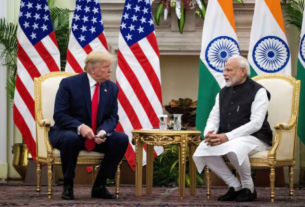President Donald Trump has called for new denuclearization talks with Russia and China, arguing that reducing nuclear stockpiles could lower defense spending. He believes the current arms race is unnecessary and financially unsustainable. His proposal has sparked debate over national security and military strategy.
“We are spending billions on weapons that should never be used,” Trump said. He wants to shift defense funding toward economic growth and infrastructure. His administration is exploring diplomatic options to start negotiations.
Trump has long criticized the size of the U.S. defense budget. He argues that reducing nuclear weapons through agreements would allow more resources for domestic priorities. His position contrasts with many lawmakers who view a strong nuclear deterrent as essential.
China has expanded its nuclear arsenal, with reports estimating it could reach 1,500 warheads by 2035. Russia has continued modernizing its nuclear forces despite international sanctions. Both nations have resisted past arms control talks with the U.S.
The administration believes personal diplomacy could help overcome these challenges. Trump has expressed willingness to meet directly with Russian President Vladimir Putin and Chinese President Xi Jinping. He argues that strong leadership can achieve breakthroughs in negotiations.
National security officials remain divided on Trump’s approach. Some believe reducing nuclear weapons could weaken deterrence against adversaries. Others argue that an arms reduction deal could improve global stability and reduce military costs.
Biden-era policies emphasized strengthening nuclear capabilities in response to threats. The Pentagon had previously warned that Russia and China were expanding their arsenals at an alarming rate. Trump’s call for talks marks a shift in U.S. defense priorities.
Congress will play a key role in approving any agreements. Many lawmakers support maintaining or increasing nuclear funding. Trump will need to convince skeptics that reducing stockpiles will not compromise national security.
The U.S. currently spends over $50 billion annually on nuclear weapons programs. Trump believes scaling back could free up funds for economic initiatives. Critics argue that cuts could leave the U.S. vulnerable in an increasingly unstable world.
China has increased military activity in the Pacific, raising tensions with U.S. allies. Russia’s actions in Ukraine have also kept NATO on high alert. Some officials warn that these threats require maintaining a strong nuclear arsenal.
Trump insists that a diplomatic deal could ease tensions. He argues that reducing nuclear risks would allow the U.S. to focus on other security concerns. His administration is drafting proposals to present to Russian and Chinese officials.
Past arms control agreements have had mixed results. The U.S. and Russia previously signed treaties limiting nuclear weapons, but compliance issues have created challenges. China has never agreed to formal arms reduction deals with the U.S.
“We need agreements that actually work,” a senior White House official said. Trump has stated that any deal must include strict verification measures. His administration wants commitments from both Russia and China before making reductions.
Some analysts believe China and Russia will not negotiate unless the U.S. offers concessions. Possible incentives include easing certain sanctions or adjusting missile defense deployments. Trump has not indicated whether he is open to such compromises.
The Pentagon will assess potential risks of reducing nuclear weapons. Military leaders must determine if reductions could affect global power balances. Trump has requested a review of strategic deterrence policies.
Critics argue that focusing on nuclear reductions could ignore other defense challenges. Cybersecurity threats, space warfare, and conventional military advancements remain pressing concerns. Some fear Trump’s proposal shifts attention away from these issues.
Supporters believe a successful deal could set a new standard for global security. They argue that arms control agreements could lead to better relations between the U.S., Russia, and China. The economic benefits of reducing defense costs also appeal to many Americans.
Trump’s reelection has brought renewed attention to his foreign policy strategies. His direct approach to diplomacy differs from previous administrations. Whether his efforts will lead to actual agreements remains uncertain.
The White House is preparing for early discussions with both nations. Officials are assessing potential frameworks for negotiations. Trump remains confident that talks can lead to meaningful results.
For now, the administration continues to balance military strength with diplomatic outreach. Nuclear negotiations will be a major test of Trump’s foreign policy in his second term. The world will watch closely to see if his strategy succeeds.




